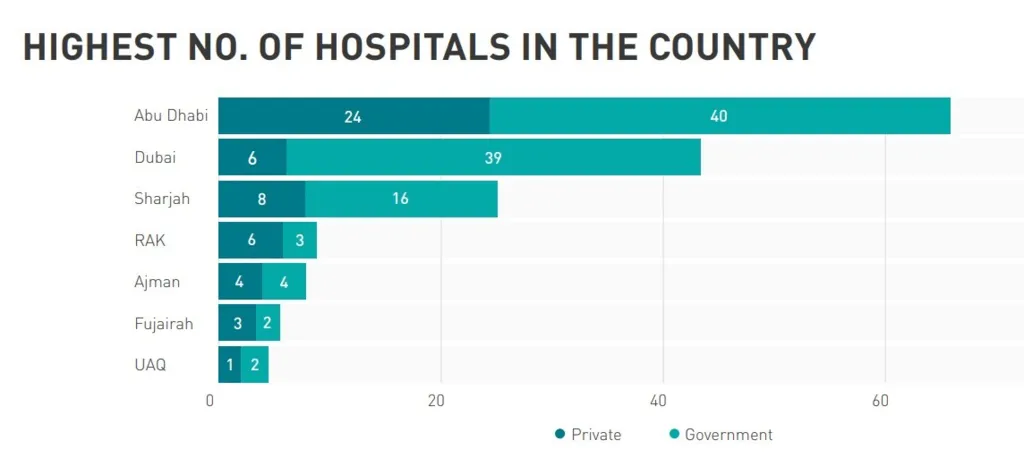$908.7M Growth Sparks UAE and Abu Dhabi Healthcare Analytics Boom
The UAE Healthcare Analytics Market is projected to generate a revenue of $908.7 million by 2030, advancing at a robust 22.1% CAGR from 2024. In 2023, the sector recorded $225 million in revenue, signifying the country’s growing stake in global health innovation. At the heart of this surge is the Abu Dhabi Healthcare Analytics Boom, powered by leading infrastructure, AI integration, research funding, and international partnerships.
 Source: Grandview
Source: Grandview
Within the UAE, Abu Dhabi stands out as the analytics powerhouse, leveraging its expansive hospital network, genomics programs, and biotech investment strategy. This article breaks down how the national trend and Abu Dhabi’s unique strengths are driving transformative change in medical care, research, and data science.
Abu Dhabi’s Infrastructure Drives UAE Healthcare Analytics Boom
With 64 hospitals and 7,689 beds, Abu Dhabi is the largest healthcare hub in the UAE, playing a critical role in analytics adoption. Hospitals use data to optimize staffing, streamline diagnostics, and improve clinical outcomes. The concentration of care facilities has made Abu Dhabi the natural testing ground for health AI applications in both government and private sectors.
 Source: Masdar Life Sciences
Source: Masdar Life Sciences
Descriptive Analytics Held 47.96% Market Share in 2023
Across the UAE, healthcare analytics spans four categories—descriptive, diagnostic, predictive, and prescriptive. In 2023, descriptive analytics dominated at 47.96%, reflecting a strong focus on real-time hospital metrics, operational performance, and patient engagement dashboards. As precision medicine gains traction, Abu Dhabi is paving the way for broader adoption of predictive and prescriptive models.
Clinical Trials and Genomics Fuel the Abu Dhabi Healthcare Analytics Boom
Abu Dhabi’s surge is closely tied to its evolving life sciences sector. The emirate has conducted 327 clinical trials, manufactured 155 innovative medicines, and sequenced 403,000 genome samples. These initiatives require robust analytics platforms to handle the complexity and scale of health data—further embedding AI and data science in day-to-day operations.
With 25+ health science academic programs and progressive legislation like Federal Law No. 11 of 2021, Abu Dhabi has built a framework for biotech commercialization and IP protection. The result is a health data ecosystem that’s agile, secure, and internationally competitive.
Global Partnerships Amplify UAE Analytics Growth
The Abu Dhabi Healthcare Analytics Boom gained new momentum in 2025 when the Department of Health – Abu Dhabi led a strategic delegation to the United States. The team secured alliances with global leaders including Sanofi, Abbott, UCSF, and Johnson & Johnson, opening doors to gene therapy trials, genome surgery centers, and vaccine production facilities.
One key milestone was the UAE debut of Tremfya®, a biologic IBD treatment previously unavailable outside the US—enabled through analytics-driven collaboration with J&J and Sheikh Shakhbout Medical City.
Genomics & AI Platforms Elevate Real-World Care
The Emirati Genome Programme has now sequenced 800,000+ samples, while Malaffi, the UAE’s national health data exchange, manages over 5 million patient records. These platforms support predictive models for risk stratification, treatment forecasting, and population-level health management—solidifying Abu Dhabi’s role in the data-led transformation of regional healthcare.
Talent and Innovation Clusters Strengthen Ecosystem
To sustain growth, Abu Dhabi invests heavily in human capital and innovation hubs. More than 2,000 long-term visas have been awarded to healthcare and biotech professionals under the Golden Visa initiative. Clusters like HELM in Masdar City, alongside institutions such as Khalifa University and NYU Abu Dhabi, help foster research, entrepreneurship, and analytics capacity at scale.
Also Read: Why Abu Dhabi Is the Driving Force in UAE Healthcare Analytics







